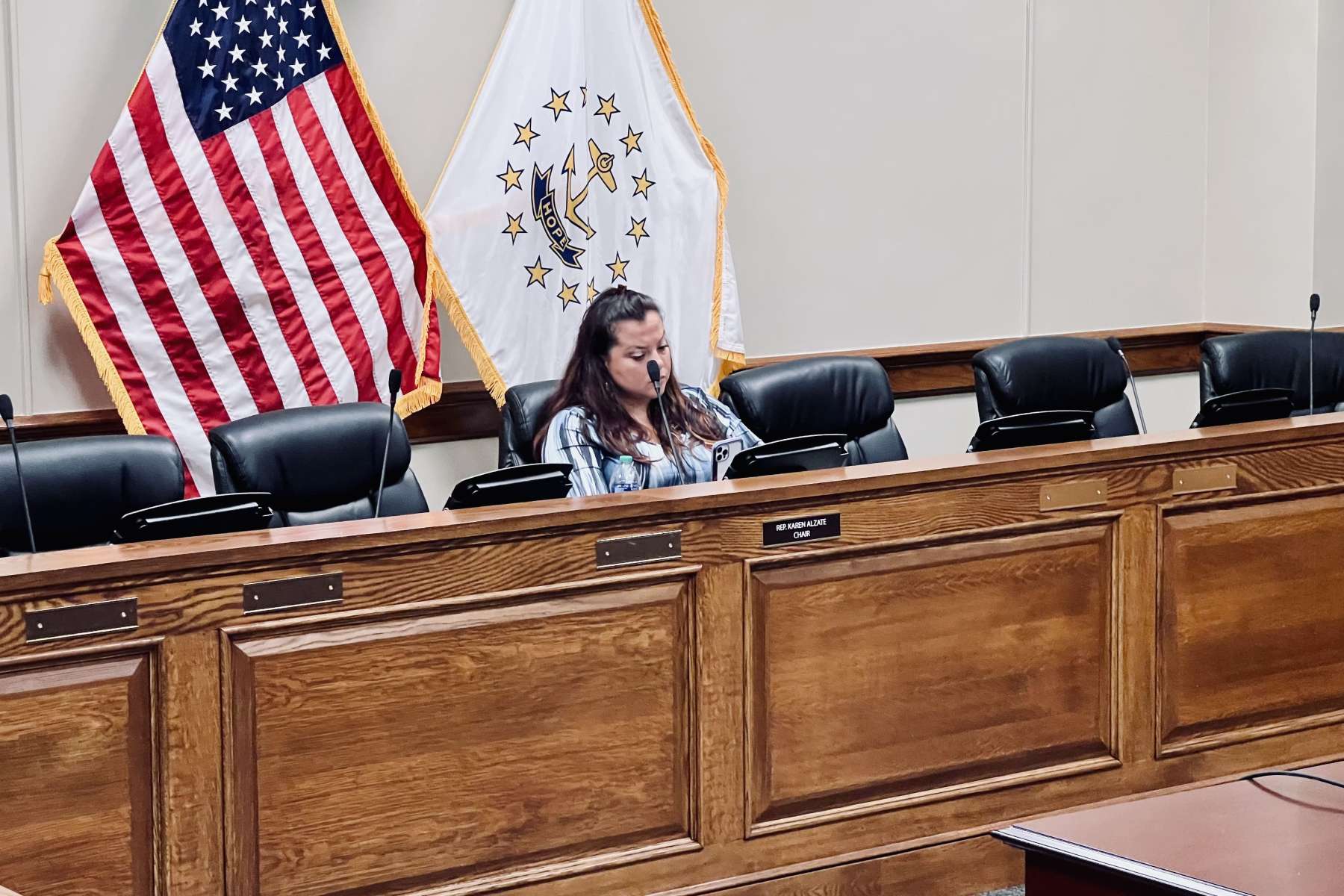General Assembly seeks to name CCRI campus after anti-LGBTQ former Senate President – during Pride month
Senate President M. Theresa Paiva-Weed was a fierce opponent of marriage equality and women’s reproductive rights. Bills in the House and Senate seek to name a CCRI campus after the still living former Senator.
June 10, 2023, 8:47 pm
By Steve Ahlquist
Senate Bill 442, introduced by the late Senator Maryellen Goodwin (Democrat, District 1, Providence), passed the Rhode Island Senate without one vote in opposition. When heard in the Senate Committee on Special Legislation, there was no testimony, no discussion. The Chair of the Committee, Senator Walter Felag (Democrat, District 10, Tiverton, Warren), noted that the bill had passed the Senate in the previous session and simply passed it again.
Upon passage the legislation would name a Newport campus of the Community College of Rhode Island after former Rhode Island State Senate President M. Teresa Paiva-Weed. In 2008 Senator Paiva-Weed became the first woman to be elected Senate President in Rhode Island history. She left office in 2017 to become the President of the Hospital Association of Rhode Island.
Senator Paiva-Weed was a fierce opponent of marriage equality and women’s reproductive rights. Under her leadership Rhode Island became the last New England state to allow members of the LGBTQIA+ community to marry, finally passing the measure in 2013. When the bill came to the floor Senate President Paiva-Weed voted against it. Two years later the United States Supreme Court struck down all state bans on same-sex marriage, making same-sex marriage legal in all 50 states.
Many members and allies of the LGBTQIA+ community feel that naming a college campus after the former Senate President legitimizes her homophobic views, so when Representative Marvin Abney (Democrat, District 73, Newport) announced that he was introducing House Bill 6493, to name a CCRI campus after the former Senate President, a group of people decided to testify in opposition – but this wasn’t that easy.
The House Committee on Special Legislation was scheduled at the unusual time of 2pm on a Friday afternoon. Most committee hearings take place on a Tuesday, Wednesday or Thursday after 4pm. The committee hearing was happening just before the full House was taking up the FY2014 State Budget, so attention was mostly that. If the committee could not hear the bill before the House went into session to finalize the budget at 2:30pm, the people who trekked to the State House to testify would be sent home, having wasted their afternoon.
Though members of the public were ready to testify, elected representatives were far from ready to hear them. The committee did not start on time. It took 35 minutes of cajoling and phone calls to recruit enough Representatives for the committee to establish a quorum. Many members of the committee were complete no-shows, including vice-chairs Grace Diaz and John Lombardi, as well as Representatives Samuel Azzinaro, Stephen Casey, Brianna Henries, and Patricia Morgan. Fortunately, the House did not go into session to take up the budget until just after 3pm, giving the committee just enough time to hear from the public.

Finally underway, the House bill was introduced to the committee by Representative Abney, who is running for the open Congressional District 1 seat recently vacated by David Cicilline. In light of his ambitions for higher office, Representative Abney’s support for a bill that seeks to celebrate a former Senator whose actions marginalized LGBTQIA+ community members is puzzling.
“She is not perfect,” acknowledged Representative Abney. “Neither are any of us.” Abney also noted that naming something after a living person is frowned upon by some legislators.
When Representative Enrique Sanchez (Democrat, District 9, Providence) brought up Senate President Paiva-Weed’s legislative history around LGBTQIA+ rights, Representative Abney suggested that her views were a product of her time, and that her views do not “take away the relevance of what she has done for her community.”
During public testimony Becca Carroll identified herself as a member of the queer community, a lifelong Rhode Islander and someone who is currently earning their Masters in Public Administration at the University of Rhode Island in addition to working full-time in higher education. In her testimony she carefully and pointedly outlined arguments against naming a CCRI campus after former Senate President Paiva-Weed. You can watch her testimony and read the transcript below:
“I’m here today to voice my vehement opposition to House Bill 6493 and it’s Senate bill counterpart, and I urge you to vote ‘no.’ Theresa Paiva-Weed, while certainly a groundbreaking woman in Rhode Island politics, was also a vocal and adamant opponent of marriage equality legislation. With her power as Senate president, she blocked any such bill from reaching the floor for years. When marriage equality did finally come to a floor vote in 2013, she voted no. Thankfully, the legislation passed despite her opposition, but the impact remains. Because of Paiva Weed, Rhode Island was the last state in New England to grant gay and queer couples the right to marriage.
“And while she was using her power as Senate President to delay the legislation, queer and gay couples in this state did not have the same basic rights as their straight peers. It is deeply disheartening and discouraging that the General Assembly would consider putting the name of someone who does not support the rights of the LGBTQIA+ Rhode Island community on a community college campus, let alone any public building. As a public institution and Rhode Island’s only community college, CCRI is meant to be a place that is welcoming and inclusive of all Rhode Islanders, not only those who are not part of the queer community.
“Naming a CCRI campus after someone who very publicly and clearly does not support the rights of the community, would not only be a disgrace to Rhode Island, but would be harmful to the many faculty, staff, and students at CCRI who are part of the queer community and to the community in Rhode Island as a whole.
“Right now, it is more important than ever that our elected officials show strong, unwavering support to queer and trans Rhode Islanders. Just this week, the Human Rights Campaign, for the first time in history, declared an unprecedented state of emergency for LGBTQIA+ people in the United States following a dangerous spike in anti-LGBTQIA+ legislation sweeping state houses across the country. More than 75 anti-LGBTQIA+ bills have already been signed, and more than 500 other bills are on the table as we speak. Queer and trans Americans are fleeing their home states because they can no longer access the healthcare they need, or for fear that they will be criminally charged simply for existing as themselves.
“Now is the time for Rhode Island to step up as a safe inclusive space for LGBTQIA+ people. Those committee members who are planning to run for reelection or higher office, or who will be attending Pride parades this month should consider that Rhode Island is a progressive state with open-minded people of all backgrounds. Naming one of our community college campuses after someone who actively fought against the rights of people in this state does a direct disservice to all Rhode Islanders.
“Further, naming the campus after someone not directly associated with the college breaks the precedent already in place. CCRI’s three other campuses are named after the college’s past presidents, or, in the case of the campus in Warwick, after the family who donated the land that the campus was built on. If the committee would like to proceed in naming the CCRI Newport Campus after someone notable, I would respectfully suggest that you consider one of CCR i’s past presidents, or if you’re seeking more of a Newport connection, the late mayor Paul Gaines. The first and only Black mayor in Rhode Island would make a far better namesake than someone who’s so famously opposed the basic rights of the community.
“I would also remind you that we are in the midst of Pride Month, which is meant to be a time of celebration and recognition of our community and history, not a time to put the names of anti-LGBTQIA+ politicians on public buildings where everyone is supposed to know that they belong.“
Also testifying in person against the bill was Charles Padgett, Student Government President at CCRI; Megan Perrera, Student Government President at CCRI; and CCRI student and Director of Student Relations for Student Elaine Soto. All three student student representatives of CCRI worried about the impact naming a campus after an anti-LGBTQIA+ Senator would have on the college’s inclusive and welcoming environment.







